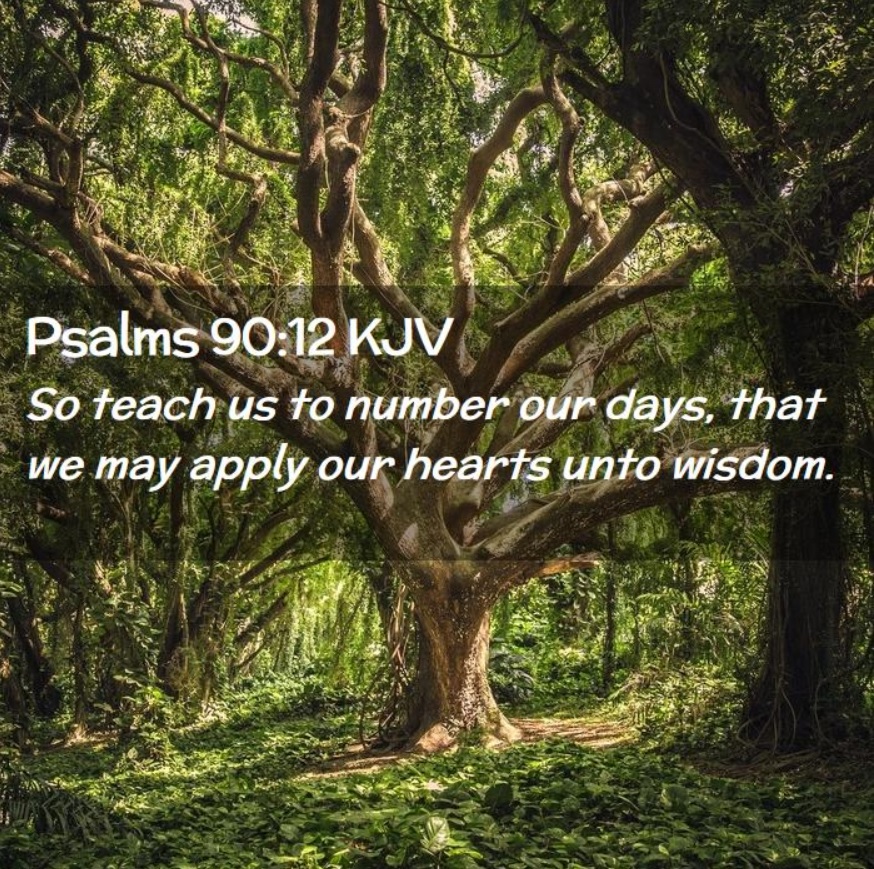“Go therefore and make disciples of all the nations…teaching them to observe all that I commanded you; and lo, I am with you always, even to the end of the age” (Matthew 28:19-20, NASB).
——————–
Contents:
1) Psalm 40 (Ken Weliever)
2) Your Life is Like Grass (David McPherson)
——————–

-1-
Psalm 40
Ken Weliever
An old Bits and Pieces magazine tells the story about an Ozark hound dog sitting in a country store howling as hounds do.
In comes a stranger and says to the storekeeper, “What’s the matter with the dog?”
“He’s sittin’ on a cocklebur.”
“Why doesn’t he get off it?”
“He’d rather holler,” the clerk replied.
Some folks are like the old hound dog, they’d rather complain about their problems than do something to solve them. As therapist and author Virginia Satir once observed, “Problems are not the problem; coping is the problem.”
As most rational people come to realize, problems are a part of life’s challenges. Unfortunately, some have preached a gospel that says, “If you become a Christian, God will remove all your troubles.” Sadly, too many have swallowed that false notion. Then they’re disillusioned when trials arise.
David, identified in Scripture as “a man after God’s own heart,” enjoyed a special relationship with the Lord. But he was not exempt from the problems, pressures and heartaches of life. Many of his Psalms reveal these struggles.
In Psalm 40 David speaks of three problems he was facing.
#1 The guilt of sin
You can hear David’s anguish as he admits and confesses his wrongs.
For troubles without number surround me; my sins have overtaken me, and I cannot see. They are more than the hairs of my head, and my heart fails within me. (Ps. 40:12)
Human nature and the problem of sin hasn’t changed in 3,000 years. Sin hurts. It brings emotional, mental and spiritual pain. Sometimes even physical pain. Sin blinds our minds. Overwhelms our feelings. And pierces the heart with sorrow and remorse. The guilt of sin is real. David knew it. And so do we.
#2 The hostility of his enemies
In verse 14, he spoke of those who sought to destroy his life. And who desired to ruin him.
This began after David slew Goliath. King Saul in fits of rage and jealousy tried to kill David. Other enemies hounded him both prior to David taking the throne and afterward. The Philistines were a constant thorn in his flesh. Then his own son, Absalom, later led a rebellion against David and tried to overthrow the throne.
Just like David, when we serve the Lord, we will encounter opposition. It may be from those in positions of power. Or even from within our own family. Don’t be surprised when you speak and stand for Truth that God’s enemies seek to suppress you.
#3 The wound of contempt
In verse 15 David alludes to some who ridiculed and mocked him. Although he was praised by multitudes, others scorned him with taunts and disdain.
Ridicule stings. It doesn’t feel good. Especially when it’s undeserved.
So, what did David do?
#1 He “waited patiently for the Lord.”
Waiting is hard. And waiting with patience is even harder. But it’s a continual theme throughout the Psalms. In Psalm 27:14, David wrote:
Wait on the Lord;
Be of good courage,
And He shall strengthen your heart;
Wait, I say, on the Lord!
We sing the song, “In His Time.” God’s purpose and providence will be exercised by Divine order, not by a human time table. Furthermore, God may choose more than one method to soothe our hurts and solve our problems.
“Sometimes God calms the storm, but sometimes God lets the storm rage and calms His child,” observed author Leslie Gould.
#2 David praised God.
In verses 4-10, David acknowledged God’s righteousness, faithfulness and loving kindness. He further recognized that God is the source of salvation and the author of Truth. He deserves our praise and adoration.
Too often when problems arise, people skip worship. Stay home. And focus on their troubles. Instead, more than ever, you need to worship. See God’s goodness. Trust in His promises. And join the great assembly in worship.
#3 David prayed (vs. 11-17)
The Psalms teach us that prayer ought to be our response when we’re hurting, facing trials, experiencing problems, and feeling weak. David’s plea is for help, deliverance, and compassion. His example is one we ought to emulate.
“Every problem is an opportunity to prove God’s power,” wrote Chuck Swindoll. “Every day we encounter countless golden opportunities, brilliantly disguised as insurmountable problems.”
When you struggle with life’s problems, seek the Lord and apply David’s solution. In the words of Corrie Ten Boom, “Let God’s promises shine on your problems.”
– Via The Preachers Word, March 8, 2023
——————–

-2-
Your Life is Like Grass
David McPherson
Throughout Scripture, God reminds us of the frailty of life. No matter how long we live, our life is but a speck compared to eternity. To emphasize our brevity, the image of grass is used.
Psalm 103:15 – “As for man, his days are like grass; as a flower of the field, so he flourishes.”
1 Peter 1:24 – because “all flesh is as grass, and all the glory of man as the flower of the grass. The grass withers, and its flower falls away.”
Elsewhere, Jesus spoke of how grass is in the field one day and thrown into the oven the next (Luke 12:28)!
Just as the grass or flower soon loses its freshness; is withered or cut down, so it is with our physical life. This should not be viewed as depressing, but rather as motivation to honor and glorify God in what limited time we have. Also, for the faithful, it’s a good reminder that the suffering and trials endured in this life won’t last long.
Hang in there. Love life and see good days. Serve the Lord. And remember, your life is like grass.
— Via Articles from the Knollwood church of Christ, December 2024
——————–
Matthew 9:12-13
“But when Jesus heard this, He said, ‘It is not those who are healthy who need a physician, but those who are sick. But go and learn what this means: “I DESIRE COMPASSION, AND NOT SACRIFICE,” for I did not come to call the righteous, but sinners.’”
— NASB
——————–
The Steps That Lead to Eternal Salvation
1) Hear the gospel — for that is how faith comes (Rom. 10:17; John 20:30-31).
2) Believe in the deity of Jesus Christ, the Son of God (John 8:24; John 3:18).
3) Repent of sins. For every accountable person has sinned (Romans 3:23; Romans 3:10), which causes one to be spiritually dead (Ephesians 2:1) and separated from God (Isaiah 59:1-2; Romans 6:23). Therefore, repentance of sin is necessary (Luke 13:5; Acts 17:30). For whether the sin seems great or small, there will still be the same penalty for either (Matt. 12:36-37; 2 Cor. 5:10) — and even for a lie (Rev. 21:8).
4) Confess faith in Christ (Rom. 10:9-10; Acts 8:36-38).
5) Be baptized in water for the remission of sins (Mark 16:16; Acts 2:38; 22:16; 1 Pet. 3:21). This is the final step that puts one into Christ (Gal. 3:26-27). For from that baptism, one is then raised as a new creature (2 Cor. 5:17), having all sins forgiven and beginning a new life as a Christian (Rom. 6:3-4). For the one being baptized does so “through faith in the working of God” (Col. 2:12). In other words, believing that God will keep His word and forgive after one submits to these necessary steps. And now as a Christian, we then need to…
6) Continue in the faith by living for the Lord; for, if not, salvation can be lost (Matt. 24:13; Heb. 10:36-39; Rev. 2:10; 2 Pet. 2:20-22).
——————–
Tebeau Street
CHURCH OF CHRIST
1402 Tebeau Street, Waycross, GA 31501
Sunday: 9 a.m. Bible Classes and 10 a.m. Worship Service
Wednesday (all but the first): 7 p.m. Bible Classes
First Wednesday of the month: 7 p.m. Congregational Song Service (about 45 minutes of singing, followed by a short talk)
evangelist/editor: Tom Edwards (912) 281-9917
Tom@ThomasTEdwards.com
https://thomastedwards.com/go/all.htm (This is a link to the older version of the Gospel Observer website, but with bulletins going back to March 4, 1990.)